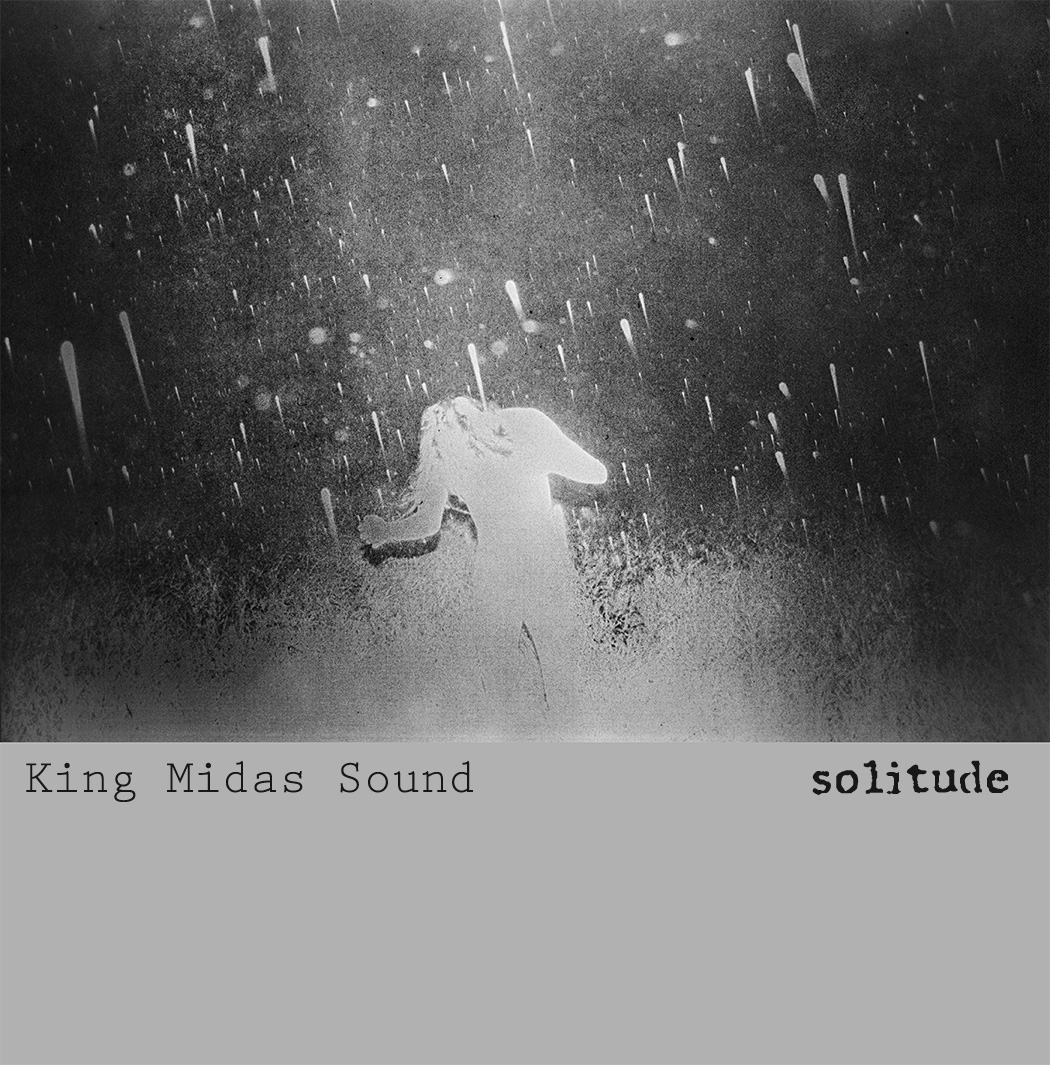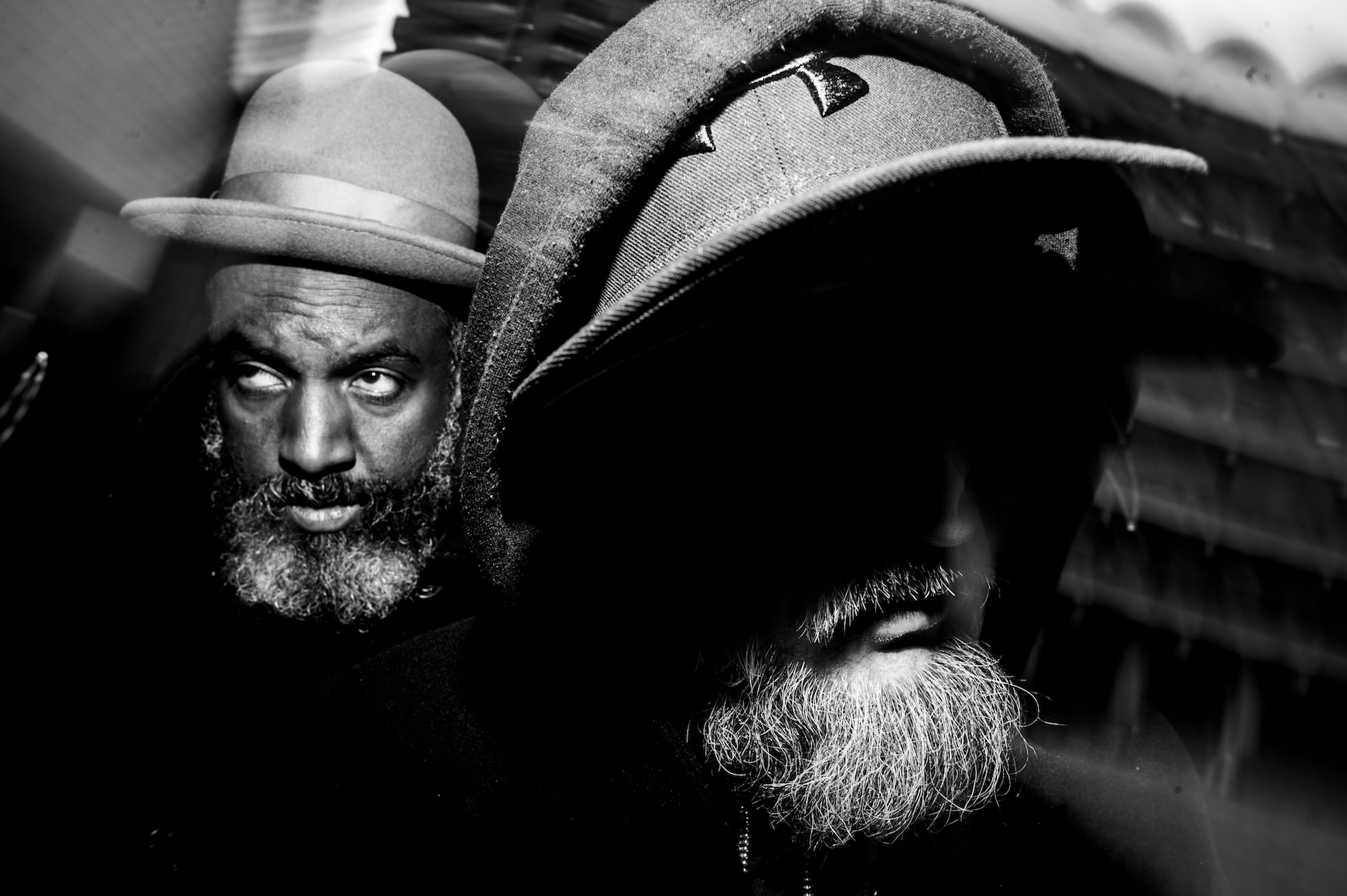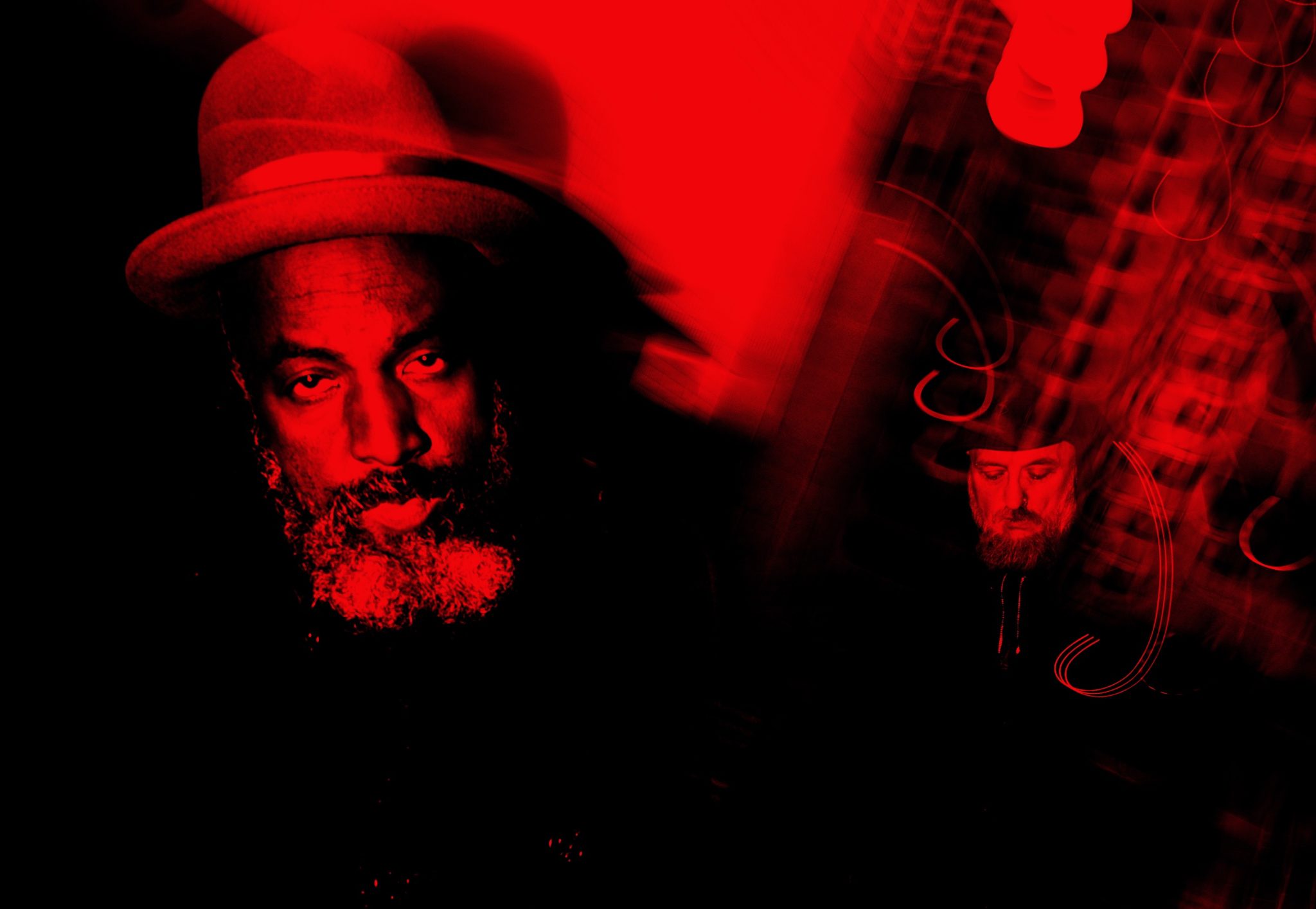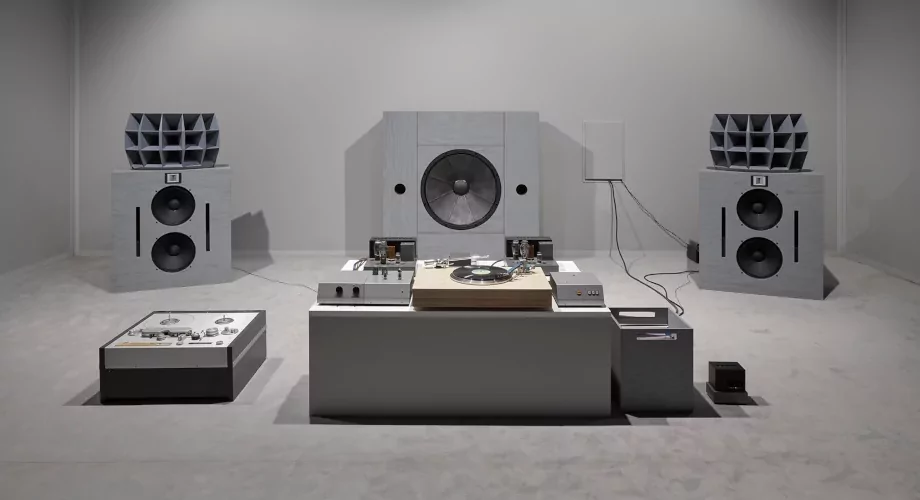Published on
April 9, 2019
Category
Features
Inspired in feel and scope by what Kevin Martin calls the “hardcore” nature of Samuel Beckett’s work, King Midas Sound’s new album Solitude burrows into the psyche and lodges itself deep within. Drawing on film soundtracks, dub poetry, demanding literature and an intense period of nocturnal recording, Kevin Martin and Roger Robinson find the universal in the personal on a record that defies you to listen further.
I have only seen Samuel Beckett’s Not I performed once. I was two days into a break-up, and as Lisa Dwan’s extraorindary motor mouth fizzed through the short script in a matter of minutes (it felt like longer), I couldn’t help but lose myself in the black void of the stage. The Guardian called it ‘breathtaking’, The Telegraph – less enthused – ‘claustrophobic’. Both seem fitting, and, although with differing implications, both seem to converge on the idea of ‘suffocation’ – the taking of breath through enclosure or constriction. I was drowning in the blackness on stage, the red lips and white teeth bobbing somewhere nearby, as this lost soul lamented and denied her own loneliness in a single, protracted breath.
The sensation of watching Not I in a state of distraction is not dissimilar to the sensation of listening to Solitude. After taking various forms, King Midas Sound returned to the nucleus of Kevin Martin (aka The Bug) and Roger Robinson for this record, holing up in a studio in Berlin and working through the night, immersed in the radical works of Samuel Beckett, Francis Bacon and Sarah Kane. Robinson cites Not I as an influence on his writing, although his delivery is far removed from the protagonist’s accelerated verbiage.
Instead, what Robinson’s verse conjures is the illusion of an ‘I’ – a first person narrator who is convincingly autobiographical, recounting a trauma which feels a lot like death, but seems to fall just short. Given the context in which the pair discuss their previous record Edition 1 with Fennesz, you fear the worst.
Regardless of the context, Solitude is a profound and shocking record. A journey through the psyche of loss and loneliness, it is a record both have advised friends in fragile states not to listen to. Martin calls it “the heaviest record I’ve ever made, but also the quietest,” knitting Robinson’s glacial observations, fragments of narrative, and mesmerising images into the fabric of the composition.
It’s not surprising to hear of Martin’s obsession with film soundtracks. At times, Robinson’s voice feels distant, lost in a vacuum of sound. (Artemiev conjuring the blankness of outer space in Solaris comes to mind). At others, Robinson is right up in your ear, high in the mix and too close for comfort. His voice evokes a body moving through the darkness, sometimes just lips and teeth, taking your breath, as the character (or characters) he has created, comes in and out of focus.

In that sense, Solitude is a complete and unapologetically stifling experience to listen to, creating a hollow, untethered, and at times absurd world, that collapses inwards and refuses to resolve.
This is a trait shared with much of Beckett’s work, where the complexity of rendering the human condition not only undermines the motivations of his characters, but at times the work itself. In Watt, one of Beckett’s early novels (which are also cited by both Martin and Robinson as major influences), some moments of potential clarity are left out of the text altogether, replaced instead by question marks.
It felt appropriate then that our conversation took place in the often deeply frustrating parallel reality of a three-way Skype call, complete with signal outages, unintentional interruptions and the crashing of plates being washed and stacked in the café behind Roger’s laptop.
As a result, occasional exchanges were irretrievably lost. But in the spirit of a record that deals with the ineffable in a very human way, the lacunas of our conversation have been retained from the transcript below, as we discussed how Solitude has surprised both Martin and Robinson in its finished form: breath-taking, claustrophobic and, perhaps ultimately, truly uplifting.
It’s fitting that we’re talking about Solitude from three different places, as the last King Midas Sound record with Fennesz was made in similar circumstances. However, it feels like this album couldn’t possibly have been made remotely.
RR: I agree, and there was something that was happening. We were working together on it, and recording together on it, in one period of time at the same time. It’s like one extended thought.
KM: They were quite unusual conditions, because it was like a factory job. We were working in the day time on the music and then unearthly hours on the poetry. We were properly in the zone, day after day after day, and absolutely immersed in the work.
RR: Also, I’m not used to working at night. Kevin works at night, but it puts me in such a different zone. I could feel my physical body dissolving. He’s like, ‘are you ready to go to the studio?’ and I’m like, ‘holy shit, OK’. It was pure psyche.

There’s a very nocturnal feel to the record, so it’s not surprising to hear a lot of it was made at night. What kind of things do you think it brought out of you, that you wouldn’t have necessarily tapped into during the day?
RR: You know, there’s something that happens late at night, when nobody else is up. I feel like there’s nobody else thinking, so you get to have all the ideas. Everybody else is sleeping, so I get to think.
When you were working on the record, were you both involved in the instrumental and poetic elements, or were the roles more defined?
KM: Well, Roger was here, so I would be working on the music, and asking Roger if he was feeling the atmosphere of each piece. And then when we were recording the poetry, I would definitely stick my nose in sometimes.
RR: More than your nose my friend, more than your nose.
[Both laugh]
KM: It was a very collaborative work. Roger didn’t play any of the instruments or compose the music as such, but there was a lot of discussion. And we knew we were heading out. It was outward bound. We knew we wanted to create something that had no antecedent. We wanted to probe extremities with the record. I think we both felt that Edition 1 was one small step towards a greater (?). [Indecipherable]
I was personally very interested to see how far out and how minimal we could take the music, whilst spinning a narrative flow with the poetry. I’m a long-time obsessive of film scores and composers. It tends to be the case that when I’ve done a lot of Bug work, I need the opposite to stay sane. Having done London Zoo I flew straight into Waiting For You. It’s definitely a way of balancing myself out, because I didn’t want to be dragged into the weight of dubstep, and I didn’t just exist as a club animal. I still love clubs, and I love the energy, but I’m also as cerebral as the next film-obsessed, literary-obsessed person. For me, the work I do with Roger is really valuable, on an emotional scale, but also as a sonic palette.
It’s interesting you mention the cerebral, as the effect of listening to the record is actually very visceral.
KM: I think the record really gets under your skin. It’s definitely an uncomfortable record. We find it uncomfortable as well. When I sent it to close friends, there was nervous laughter. And I’ve got to say, we find this a shocking record too. [Roger laughs]. I’ve been telling people I know that it’s the heaviest record I’ve ever made, but it’s also the quietest. For me it definitely reaches depths. You draw breath, and it’s got a wow factor that we didn’t know we would attain until after the fact.
RR: Three quarters of the way through, I definitely had a sense of relishing pushing the limits of my tastes and inclinations. This is good, because it’s making me kind of worried.
KM: It’s really important to challenge your own comfort zones.

You say that the end result surprised you, but were there moments in making the record that helped define where you were heading?
KM: I’m a major fan of Roger’s work, and also his tonality, and his delivery. When we first discussed it, we wondered whether or not to include songs, and once we’d nailed the first one or two poems, I said, ‘Roger we need to really concentrate on this’. And knowing Roger … [indecipherable] … I think he was a little bit reluctant at first.
RR: I just have to rephrase that. In the studio, I was singing songs, I was doing a couple of poems, and then after the poems, Kevin said, ‘Yeah, we’re doing a poetry album.’ And I was like ‘Whaaat?!’
One element of how powerful the record is, is the assumption that it’s on some level autobiographical. However, the way you’re talking about the process, it sounds like things have emerged almost unintentionally.
RR: I think there’s a difference between being autobiographical, and having something in you. As me and Kevin say all the time, we’re both happily married men, but at some point we’ve been in the depths of love mire, you know what I’m saying? A lot of people are taking it as if this is one person all the way through, but to be honest I didn’t think about it like that, it just happened.
KM: I think it’s because your tone is very consistent, and I think people generally always assume that singers are autobiographical.
There’s also something about how specific and personal the observations are, that make you feel like you’re in caught up in the middle of this intimate relationship… The image of ‘wet hair’ in ‘You Disappear’ for example. It’s in the specifics that the universal emerges.
KM: That’s a big testament to Roger’s skills and craft, and I think exactly the same.
RR: Ah thank you, man.
KM: For me, what was really crucial was … [indecipherable] … When I suggested tackling a few themed records – the first being loss and solitude on this one – it was very much with the idea that it’s a global taboo, yet it’s something that affects everyone: male, female, black, white, whatever the demographic, we’ve all suffered that feeling of loss.
RR: I think people always assume the ‘I’ in literature is autobiographical. But sometimes the ‘I’ is just creative. Having said that, for me to write this, there must be some type of autobiography somewhere, because it doesn’t come from fresh air. The influences for this album are English literature and art, when they really go there. People like [Samuel] Beckett, [Francis] Bacon, Sarah Kane, that type of feeling. I’m really interested in the idea that in England, sometimes people don’t talk much, but when they do, it is all coming out. Sylvia Plath too.
KM: Beckett was a proud Irishman! So fuck the English thing, OK.
[Both laugh]
RR: OK, Beckett though…
Let’s talk about Beckett, because you mention the ‘I’ in literature, which he plays with throughout, very specifically. Also in making a record about loss, the feeling seems surreal at times; the experiences are not linear, and sometimes quite absurd.
RR: It happens all the time in English art and literature. You look at someone like Damien Hirst – a lot of people don’t like him, but he deals absurdly with real death. When you slice a real shark in half and put it in formaldehyde… You could see that in a magazine, but when you see actually see that in real life, you’re like ‘holy shit’. And I would say he’s in that big tradition of Bacon, Beckett, Sarah Kane, Lucian Freud. It’s all linked.

Were there were any specific texts that inspired you?
RR: Not I, and some of his novels too. Beckett’s novels are fucking dope, but he gets no props for them at all.
KM: It’s funny you should say that – Roger and I have had this conversation, and actually I’m not a big fan of his plays – but it was his short stories, the trilogy in particular, that really hit me hard. I read it when I was about nineteen, so it just took me apart at that age.
RR: Do you know Sarah Kane’s theatre? It is some tough going, you know what I’m saying, but incredible. She was only 28 years old when she died, but I’m telling you, I’ve seen Sarah Kane plays when Sarah Kane was alive, and I was like ‘holy shit’. People were walking out, but you couldn’t deny that you were in the face of something great and epic.
KM: You know, when we bandy names like Samuel Beckett and Francis Bacon around, we are very well aware that they are peaks of creativity. It’s not idol name-checking, they’re more just people we are discussing during the making of the record. They’re like yardsticks of what we’re trying to achieve in terms of intensity, thoroughness and mind-set, knowing that they were masters of existential diagnosis.
RR: I would say it’s more mood board than actually looking at the work and referencing it. What could be the feel of this thing?
KM: And I can remember thinking to myself before we were starting on this: how would a Francis Bacon triptych sound? I think it’s good to set the bar quite high, and even if you don’t achieve that, at least you know you tried to do something that takes you out of your comfort zone. We were also really aware that we wanted to make a piece of work that wasn’t about superficial entertainment.
RR: Yeah, that was a big thing.
KM: At the moment, I feel like the music industry is just overflowing with mediocrity.
[Roger laughs]
KM: What people seem to tap into, and what the industry seems most interested in peddling now, is middle of the road. We know people like Beckett and Bacon redefined extremity in art, and that was partly through honesty and a genuine curiosity for how you tackle the subjects that most people bury deep within.

The notion of ‘solitude’ also evokes something quite peaceful, almost meditative. Was there a feeling of catharsis for you both in making the record?
KM: I think it was a feeling of therapy and catharsis definitely. I can’t speak for Roger, but I didn’t feel like it was crushing me, I felt elated, to translate and transcribe a void… Oh Roger’s left us.
[Roger’s Skype connection drops out]
As I was saying, many great artists that I’ve ended up cherishing, like Joy Division on the one hand, or Nina Simone on the other, when I first heard their voices, they struck me as ugly voices. And when I first immersed myself in their lyricism, I felt like the lyrics were overwhelmingly down and oppressive. But actually the more enamoured I became, and the more obsessed I became by those two examples, the more I realised that you find comfort in knowing that other people have had the same struggles. I think this album isn’t sadistic at all, although it has sense of deep drawing of breath at times within it.
The hope isn’t to crush people with what we’ve released. In fact, I’ve already seen it with people on social media reacting to it very openly, that we’d helped them through a bad time. I’ve warned people who I know are in fragile states lately not to listen to this record, because it may just prove too much, but other people have reacted the opposite way, so it’s intriguing.
I’m just wondering… shall I try and re-call? I’ll call you back in just a sec.
[Call ends / Call begins]
KM: Hello, I’m here. Roger? No idea… Maybe his phone’s died. Shall we carry on? Let’s try once more. I’ll stop again and let’s try and reconnect.
[Call ends / Call begins]
KM: Hello? Rog, are you there? I’ll try once more. I’ll try once more.
[Call ends / Call begins]
How about now?
KM: I’m here, but I’m not hearing the café. Rog, you there?
RR: Yo.
KM: You left us, Roger.
RR: I’m here. I’m back. I missed the whole thing though! You probably didn’t know I was gone Kevin was taking so much. [Laughs]
As the record evokes a feeling rather than any obvious antecedents, there’s a desire to try and ground it in reference points that might help make sense of what we’re listening to.
KM: I agree, I think when you feel completely lost, and you feel completely alone, you feel like you’re in some surreal no-man’s land, some twilight zone, and it’s hard to make tangible. It’s hard to give it a soundtrack, it’s hard to give it form that can in anyway get near the intensity of the feeling.
RR: One of the things I was aware of when I used to be alone was that moments would take so long, the day would take so long. Jesus, how long is this day? With loneliness, you’re aware of every second. I mention it in the track (‘You Disappear’) where “seconds move one second into another”. Time extends because loneliness weighs in on you. It makes you aware of your time.
You mention soundtracks there again, Kevin. Did you have anything visual in your minds while you were putting this together?
KM: I was just stunned by some of Roger’s turns of phrase. I just remember him suddenly talking about Loch Lomand. [Roger laughs]. I was awestruck by the detail that Roger created. And I know Roger is a fan of magic surrealism in literature, and Roger’s short stories have always struck me as masterful in amplifying the surreal in very mundane, every day life. How every moment of every day creates magic. I think the visual element came in just focussing on how completely chaotic and kaleidoscopic every day life can be. It’s a soundtrack to (?). [Indecipherable]
King Midas Sound’s Solitude is out now via Cosmo Rhythmatic
Photos: Nick Sayer





